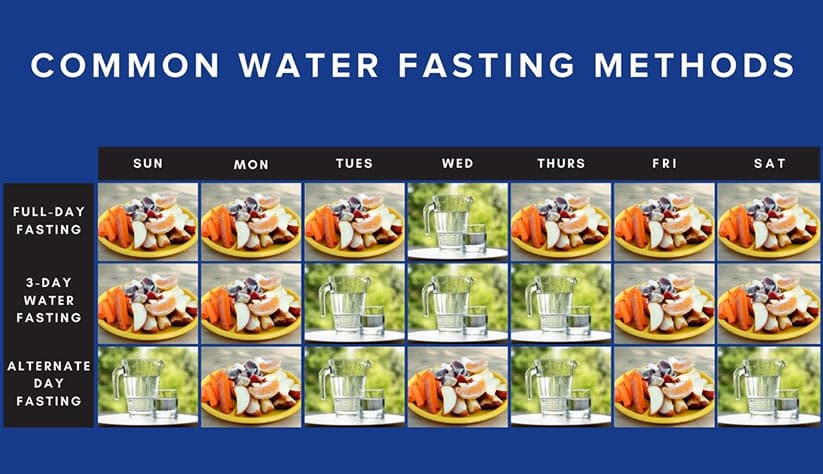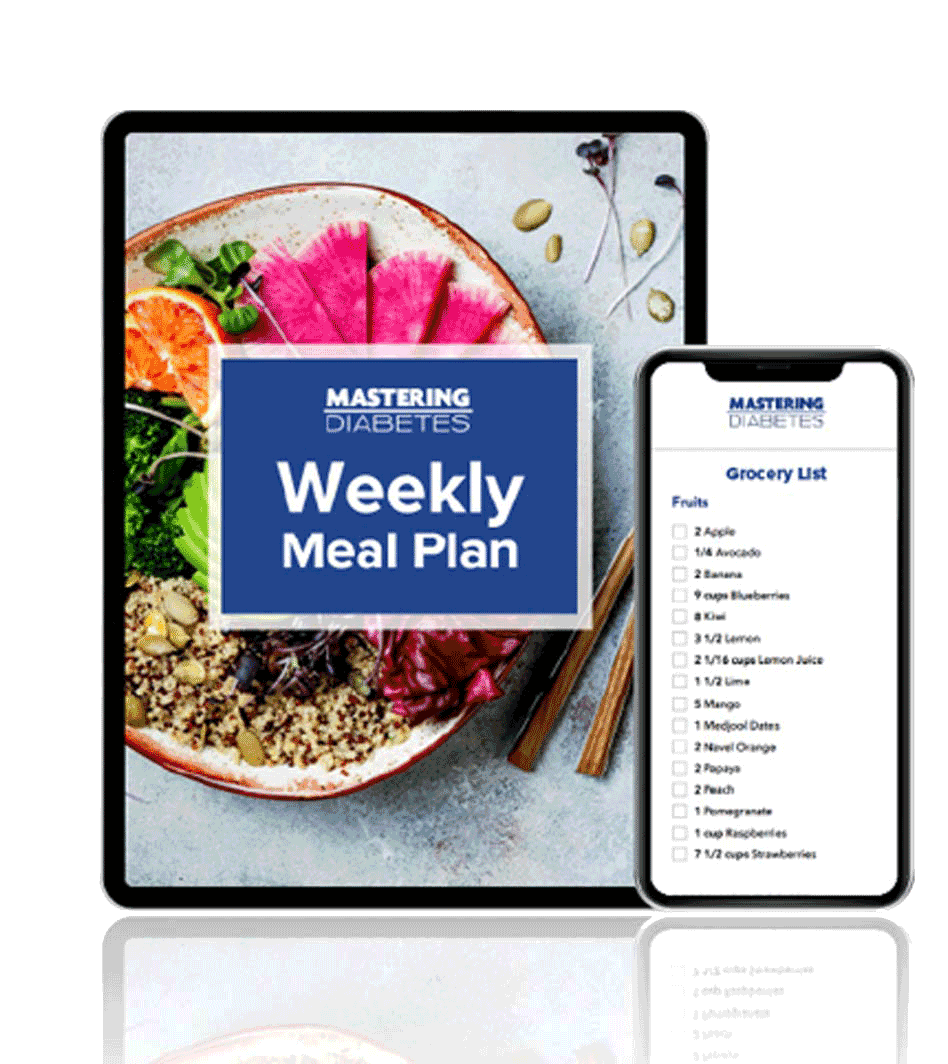
What Is Water Fasting?
Water fasting is a strict form of intermittent fasting in which certain days (or groups of days) throughout the week are designated as ‘water fasting days’, in which you consume nothing besides water.
This strategy does take some inspiration from the science behind intermittent fasting, which has shown well-documented and evidence-based benefits for weight loss, your immune system, and your metabolic health.
However, some of the more extreme versions of water fasting (in which fasts last for up to 72 hours or even longer), are supported by very little research and may present serious health risks.
In this article, we’ll explore water fasting in the context of intermittent fasting — a tried and true method for weight-loss and improving your overall health — and explore where current water fasting recommendations may go a little too fa
Common Water Fasting Methods

There are currently three very popular methods of water fasting: full-day fasts, 3-day water fasts, and alternate-day fasting.
Why Do People Try Water Fasting?
In some cases, people choose to fast for extended periods of time for personal or religious reasons, like in the case of Ramadan or other religious ceremonies.
However, we’ll primarily focus on water fasting as a health strategy and its various purposes.
The Science Behind Intermittent Fasting
The health benefits of intermittent periods of calorie restriction are actually not new information. In fact, these studies date back more than 75 years and suggested that periods of calorie restriction increase health and longevity.
In fact, calorie restriction is so powerful, it’s the only known intervention that has been proven to extend longevity in many species studied to date.
It’s for this reason that the science behind intermittent fasting emerged. As it turns out, the human body enters a biological state called autophagy during long periods without food.
In this state, your body switches from burning recently-digested food to burning excess glucose, fat, and protein, which can contribute to weight loss as well as improve your immune system and overall health.
In addition, for people who have unhealthy habits (like excess eating, drinking, or drug use), this period of time also offers a form of detox, in which you are no longer consuming harmful substances or amounts of substances.
So there’s a very real benefit to any form of intermittent fasting (not just water fasting), especially for those struggling with weight and its many ensuing complications.
The Popularization of Water Fasting
It was relatively recently that the research of Alan Goldhamer led to the popularization of water fasting, a system in which closely supervised patients would undergo a longer fast in order to help with weight loss, cardiovascular health, and a number of other health challenges.
And in a medically supervised environment, the results were tangible, yielding mostly positive results with doctors able to intervene in the case of any nutritional deficiencies or medical complications.
Is Water Fasting Safe?
This question depends on the length and intensity of your water fast.
If you are water fasting using the ‘full-day fast’ or ‘alternate-day fast’ strategies, you are just as safe as with any other form of intermittent fast, and only have an elevated risk if you have gout, type 1 or type 2 diabetes, eating disorders, or are elderly, sick, or pregnant/breastfeeding.
However, if you are following a ‘3-day water fast’, your risks can be far more severe even if you are completely healthy, and the science has not yet determined whether this extended fasting period provides commensurate benefits.
It is highly recommended NOT to undergo a fast of any longer than 72 hours without medical supervision.
The (Potential) Benefits
The direct health benefits of any intermittent fast are autophagy, which helps burn fat and reduce oxidative stress in your body, as well as potentially making it easier to maintain a calorie deficit (though this is not guaranteed).
Reducing oxidative stress has been proven to help improve your immune function in the short-term, and reduce your risk for early aging and long term diseases like Alzheimer’s.
And if you’re currently struggling with the many complications of being overweight (which include high blood pressure, high cholesterol, high blood glucose, and increased risk of chronic diseases), weight loss to your target weight can be incredibly powerful.
It’s worth noting, however, that these benefits can be achieved through less intense forms of intermittent fasting (like 16:8 intermittent fasting, or 24 hours fasts) combined with an improved diet.
There is little research on whether or not these benefits are significantly increased during fasts longer than 24 hours.
The Risks Involved
If you are following either full-day water fasting or alternating day water fasting, your risks of side effects are exactly the same as with any form of 24-hour intermittent fast, and can include:
However, if you’re attempting to follow three-day water fasts or fasting for even longer periods of time, you can expose yourself to all of these risks even more severely, along with the possibility of:
These risks can definitely be mitigated by following a water fast with a trained medical supervisor, but it’s worth assessing if this is the most effective way to get the most out of your fast.
Alternatives To Intense Water Fasting

If you’re looking to lose weight and improve your overall health without some of the risks of the more intense forms of water fasting, there are three other key strategies that we recommend:
The Best Diet for Weight Loss and Health
If you’re looking to lose weight and improve your overall health in the long term (especially if you’re dealing with any form of diabetes), the research points to a low-fat, plant-based, whole-food diet that’s high in natural carbohydrates.
Compared to some other dietary strategies like keto, which have short term results but can be disastrous to your long term health, this plant-based strategy has been proven to help lose weight and lower your insulin resistance without those negative side effects.
So one very possible option is to simply change the type of food, rather than your eating habits.
Ramp Up the Exercise
Another way to match the benefits of fasting and water fasting is to simply ramp up your physical activity.
Whether that means increasing the intensity of your existing workouts, adding moderate physical activity like walking and swimming to days you might not have exercised before, or simply making sure you hit your step count, the research is clear: exercise can make an impact.
The Wide World of Intermittent Fasting
Water fasting isn’t the only way to take advantage of autophagy and the benefits of intermittent fasting. In fact, there are a number of different intermittent fasting and eating patterns that might work just as well for you without posing the same risks.
For example, many people find success with 16:8 fasting, in which eating and fasting are spread out throughout each day, rather than choosing a specific day to not eat.
Tea fasting or green juice fasting are another option, which take advantage of the health benefits of green teas and herbal teas, or low calorie juices while keeping your body in autophagy.
Or, you can combine intermittent fasting and moderate water fasting with any (or all) of the strategies above, for a three-pronged strategy that can yield results fast.
Our Take: Do The Potential Benefits Outweigh The Risks?
When it comes to water fasting as a form of moderate intermittent fasting, the benefits are tangible, and as long as you follow the body of well-established, well-documented research, you should be able to improve your health without negative side effects.
However, in terms of longer, more extreme solutions like a multiple day or longer water fast (even with medical supervision), we think that the research actually points to different solutions, like switching to a low-fat, plant-based, whole-food diet, or increasing your exercise.
Combined with moderate intermittent fasting, these dietary and lifestyle changes can produce very quick results for your metabolic wellness, your blood glucose (blood sugar), your weight, and many other aspects of your overall health.
If you’re uncertain about which of these dietary and lifestyle changes might be right for you, you can reach out to our team of Mastering Diabetes coaches.
Working together with these diabetes care experts and a trusted certified dietitian, you can tailor your dieting and lifestyle changes to your body and your specific needs.
Stop Guessing What to Eat
Get Delicious Recipes Sent to Your Inbox Every Week!

Discover the custom-designed Weekly Meal Plan that gives you clarity on what to eat and how to shop to simplify your journey to lower blood sugar, weight loss, and your best A1c




